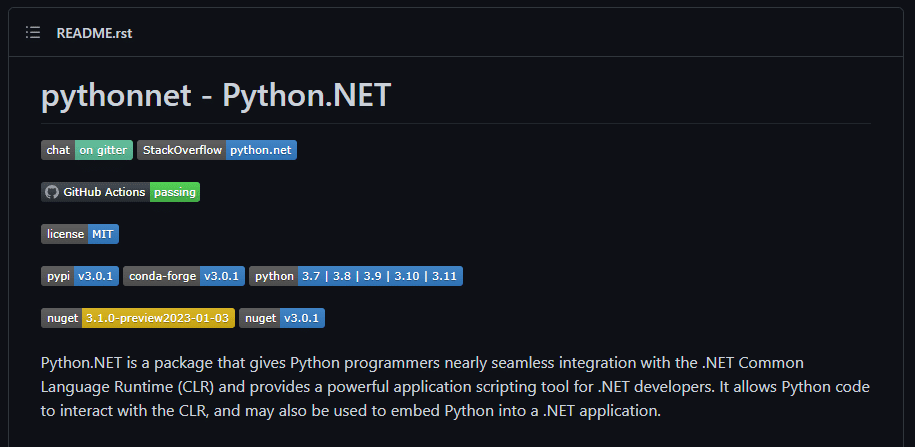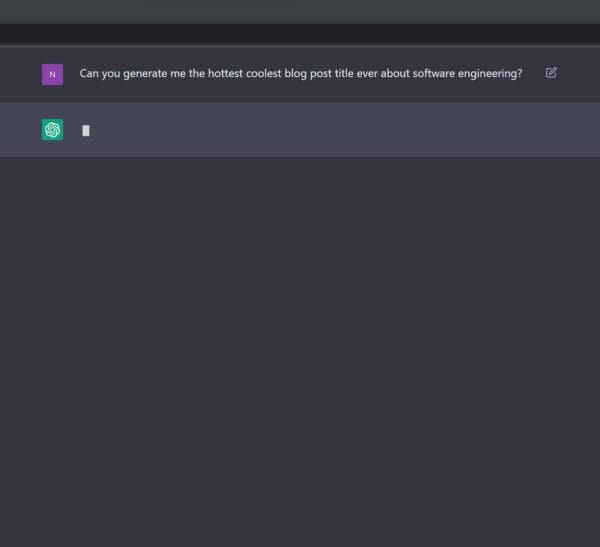Content that is all about programming and coding in C# and dotnet! Find examples of code you can use along with tutorials.
Python is a powerful and versatile programming language that has become increasingly popular. For many, it's one of the very first programming languages they pick up when getting started. Some of the highest traffic posts on my blog many years after they were written look at using C# and Python together. Today we're going to explore how you can use Python from inside a C# .NET Core application with much more modern approaches than my original articles. Enter Pythonnet! Pythonnet Package & Getting Started We're going to be looking at Python for .NET in order to accomplish this goal. This library allows you to take advantage of Python installed on the running machine from within your .NET Core applications. You must configure it to point at the corresponding Python DLL that you'd like to use, and after a couple of…
If you have an internet connection then you have probably heard of ChatGPT from OpenAI by now. Odds are you might have even given it a whirl to see what it's all about. Personally, I know that I was quite skeptical at first but I've been blown away at how well it's able to converse about topics I ask it. I've even asked it to generate various scenarios for me and it will conclude by explaining why the different facets it chose were good choices. Incredible stuff. I'll be using this to help chip away at content for my role playing game. When it comes to using OpenAI effectively, I have a great deal to learn. It's all very new to me, especially with respect to how to structure prompts and get the most out of the interactions with such…
I love dependency injection frameworks ever since I started using them. Specifically, I'm obsessed with using Autofac and I have a hard time developing applications unless I can use a solid DI framework like Autofac! I've recently been working with Xamarin and found that I wanted to use dependency injection, but some of the framework doesn't support this well out of the box. I' was adamant to get something going though, so I wanted to show you my way to make this work. Disclaimer: In its current state, this is certainly a bit of a hack. I'll explain why I've taken this approach though! In your Android projects for Xamarin, any class that inherits from Activity is responsible for being created by the framework. This means where we'd usually have the luxury of passing in dependencies via a constructor and…
The COVID-19 pandemic has caused many of us to stay isolated and at home, but that's OK! I genuinely enjoy developing software and wanted to take this opportunity to focus on learning. Having some downtime has afforded me to try putting together a system that I otherwise might not have explored building. In this article, I'll share different aspects about an application I'm building that purposefully put me outside of my comfort zone. In my opinion, having downtime is an opportunity to learn and grow! It's time to take advantage of that. When the app and system is ready to showcase I'll share more insight into what's actually being built! The Client Framework The application being built was intended to run on multiple mobile platforms, so Xamarin was my choice here. I have briefly used Xamarin several years ago, but…
Organizing code into Autofac modules can make maintaining code much easier and improve extensibility! It all starts with the Autofac module class. Check it out!
In Unity3D, the scripts we write and attach to GameObjects inherit from a base class called MonoBehaviour (and yes, that says Behaviour with a U in it, not the American spelling like Behavior... Just a heads up). MonoBehaviour instances can be attached to GameObjects in code by calling the AddComponent method, which takes a type parameter or type argument, and returns the new instance of the attached MonoBehaviour that it creates. This API usage means that: We cannot attach existing instances of a MonoBehaviour to a GameObject Unity3D takes care of instantiating MonoBehaviours for us (thanks Unity!) ... We can't pass parameters into the constructor of a MonoBehaviour because Unity3D only handles parameterless constructors (boo Unity!) So what's the problem with that? It kind of goes against some design patterns I'm a big fan of, where you pass your object's…
Why Consider Using Autofac With Unity3D? I think using a dependency injection framework is really valuable when you're building a complex application, and in my opinion, a game built in Unity is a great example of this. Using Autofac with Unity3D doesn't need to be a special case. I wrote a primer for using Autofac, and in it I discuss reasons why it's valuable and some of the reasons you'd consider switching to using a dependency container framework. Now it doesn't need to be Autofac, but I love the API and the usability, so that's my weapon of choice. Building a game can result in many complex systems working together. Not only that, if you intend to build many games it's a great opportunity to refactor code into different libraries for re-usability. If we're practicing writing good code using constructor…
Looking to get started using dependency injection with Autofac in your projects? Here's a quick primer on what it is and how to get going for your next project.
Unity3D Default .NET Framework I recently wrote that I wanted to start writing more Unity3D articles because I'm starting to pick up more Unity3D hobby work. It felt like a good opportunity to share some of my learnings so that anyone searching across the web might stumble upon this and get answers to the same problems I had. Unity3D as of 2018.1.1f1 (which is the version I'm currently using), still defaults to using .NET 3.5 as the framework version. Nothing wrong with that either. I'm sure there are reasons that they have for staying at that version, probably because of Mono and cross platform reasons if I were to guess, so I'm not complaining. For reference, this setting in Unity3D is referred to as "Scripting Runtime Version". So if you're googling more about this later, that's what Unity calls it.…
Should Every Class Have an Interface? This is part two in the sub-series of "Should Every Class Have an Interface?", and part of the bigger "What Makes Good Code?" series. Other Peoples' Code So in the last post, we made sure we could get an interface for every class we made. Okay, well that's all fine and dandy (I say half sarcastically). But you and I are smart programmers, so we like to re-use other peoples' code in our own projects. But wait just a second! It looks like Joe Shmoe didn't use interfaces in his API that he created! We refuse to pollute our beautiful interface-rich code with his! What can we do about it? Wrap it. That's right! If we add a little bit of code we can get all the benefits as the example we walked through originally. It's…




